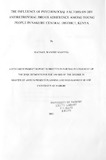| dc.contributor.author | Manyeki, Rachael W | |
| dc.date.accessioned | 2012-11-28T12:28:16Z | |
| dc.date.available | 2012-11-28T12:28:16Z | |
| dc.date.issued | 2012 | |
| dc.identifier.uri | http://erepository.uonbi.ac.ke:8080/xmlui/handle/123456789/7302 | |
| dc.description.abstract | HIV and AIDS has had a devastating effect on humanity since its discovery in 1984. However gains made in research have seen improvements in managing the condition and transformed HIV from an acute condition to a chronic illness that is manageable and survivable. Since HIV has been present in the population for a while now, more and more young people are living with the virus as a result of being perinatally infected or behaviorally acquired. Such young people who are navigating through a critical part of their life undergo numerous challenges in maintaining adherence to medication.
This study investigated the influence of psychosocial factors on adherence to treatment for HIV among young people. The study sought to investigate the extent ARV adherence among young people is influence by psychosocial factors; psychological factors, alcohol and drug abuse; patient's social environment; and the nature of health care provision. The study utilized descriptive survey design to collect primary and secondary data from representative sample. Structured questionnaires and oral interviews were used to collect primary data for the study from the respondents while secondary data was obtained from document reviews.
Findings revealed a significant correlation between' depression and adherence (-0.633) implying that that YPLWHIV who are experiencing depressive symptoms are less likely to adhere while those who are anxious are more likely to adhere. Alcohol abuse was a major contributing factor to depression and non-adherence with a significant correlation being established between alcohol and drug adherence (-0.664). The finding also revealed high disclosure rate as well as high drug self-efficacy and perception of social support which in turn positively influenced adherence. Provision of health care meets the youth expectations at the facility. The study proposes efforts to address depression, address alcohol and drug abuse and improve self-drug efficacy as a way of improving adherence. | en_US |
| dc.language.iso | en_US | en_US |
| dc.publisher | University of Nairobi, Kenya | en_US |
| dc.title | The influence of psychosocial factors on HIV antiretroviral drugs adherence among young people in Nakuru Central District, Kenya | en_US |
| dc.title.alternative | Thesis (MA) | en_US |
| dc.type | Thesis | en_US |

